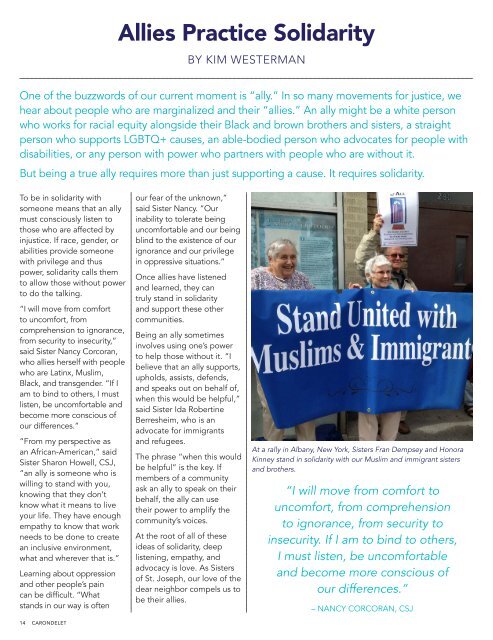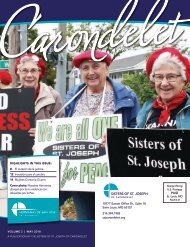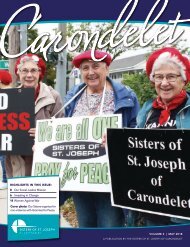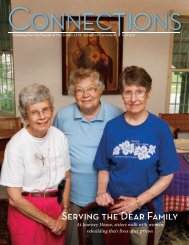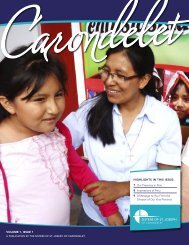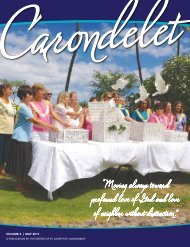2019 Carondelet Magazine FINAL
Create successful ePaper yourself
Turn your PDF publications into a flip-book with our unique Google optimized e-Paper software.
Allies Practice Solidarity<br />
BY KIM WESTERMAN<br />
Standing with Survivors of Human Trafficking<br />
BY DIANE SMITH, CSJ<br />
One of the buzzwords of our current moment is “ally.” In so many movements for justice, we<br />
hear about people who are marginalized and their “allies.” An ally might be a white person<br />
who works for racial equity alongside their Black and brown brothers and sisters, a straight<br />
person who supports LGBTQ+ causes, an able-bodied person who advocates for people with<br />
disabilities, or any person with power who partners with people who are without it.<br />
But being a true ally requires more than just supporting a cause. It requires solidarity.<br />
To be in solidarity with<br />
someone means that an ally<br />
must consciously listen to<br />
those who are affected by<br />
injustice. If race, gender, or<br />
abilities provide someone<br />
with privilege and thus<br />
power, solidarity calls them<br />
to allow those without power<br />
to do the talking.<br />
“I will move from comfort<br />
to uncomfort, from<br />
comprehension to ignorance,<br />
from security to insecurity,”<br />
said Sister Nancy Corcoran,<br />
who allies herself with people<br />
who are Latinx, Muslim,<br />
Black, and transgender. “If I<br />
am to bind to others, I must<br />
listen, be uncomfortable and<br />
become more conscious of<br />
our differences.”<br />
“From my perspective as<br />
an African-American,” said<br />
Sister Sharon Howell, CSJ,<br />
“an ally is someone who is<br />
willing to stand with you,<br />
knowing that they don’t<br />
know what it means to live<br />
your life. They have enough<br />
empathy to know that work<br />
needs to be done to create<br />
an inclusive environment,<br />
what and wherever that is.”<br />
Learning about oppression<br />
and other people’s pain<br />
can be difficult. “What<br />
stands in our way is often<br />
our fear of the unknown,”<br />
said Sister Nancy. “Our<br />
inability to tolerate being<br />
uncomfortable and our being<br />
blind to the existence of our<br />
ignorance and our privilege<br />
in oppressive situations.”<br />
Once allies have listened<br />
and learned, they can<br />
truly stand in solidarity<br />
and support these other<br />
communities.<br />
Being an ally sometimes<br />
involves using one’s power<br />
to help those without it. “I<br />
believe that an ally supports,<br />
upholds, assists, defends,<br />
and speaks out on behalf of,<br />
when this would be helpful,”<br />
said Sister Ida Robertine<br />
Berresheim, who is an<br />
advocate for immigrants<br />
and refugees.<br />
The phrase “when this would<br />
be helpful” is the key. If<br />
members of a community<br />
ask an ally to speak on their<br />
behalf, the ally can use<br />
their power to amplify the<br />
community’s voices.<br />
At the root of all of these<br />
ideas of solidarity, deep<br />
listening, empathy, and<br />
advocacy is love. As Sisters<br />
of St. Joseph, our love of the<br />
dear neighbor compels us to<br />
be their allies.<br />
At a rally in Albany, New York, Sisters Fran Dempsey and Honora<br />
Kinney stand in solidarity with our Muslim and immigrant sisters<br />
and brothers.<br />
“I will move from comfort to<br />
uncomfort, from comprehension<br />
to ignorance, from security to<br />
insecurity. If I am to bind to others,<br />
I must listen, be uncomfortable<br />
and become more conscious of<br />
our differences.”<br />
– NANCY CORCORAN, CSJ<br />
The Sisters of St. Joseph of <strong>Carondelet</strong> envision a world without slavery, and we are working<br />
with many partners to make that a reality.<br />
When we think of human<br />
trafficking, we often<br />
picture women forced into<br />
prostitution, but this is just<br />
one type of trafficking.<br />
Victims of any age and<br />
gender may be forced<br />
into a wide variety of labor<br />
including agricultural work,<br />
manufacturing, janitorial<br />
services, hotel work,<br />
construction, domestic<br />
servitude, health services,<br />
hair and nail styling, and<br />
strip club dancing.<br />
Poverty, lack of education,<br />
immigration policy,<br />
environmental conditions,<br />
fractured families, and a<br />
lack of good job<br />
opportunities are the real<br />
causes of human trafficking.<br />
Human traffickers prey on<br />
their victims by promising<br />
a life of hope and greater<br />
opportunity. Instead of<br />
delivering people to better<br />
lives, traffickers unjustifiably<br />
profit from the labor and<br />
toil of their victims, who<br />
they force, through violence<br />
and intimidation, to work in<br />
brothels and factories.<br />
Fortunately, there is more<br />
awareness among law<br />
enforcement agencies,<br />
emergency room personnel,<br />
and those who deal with<br />
the public like airline<br />
employees to recognize<br />
possible victims. Hotel<br />
chains are taking steps to<br />
partner with ECPAT-USA,<br />
a child right’s organization<br />
focused on ending the<br />
sexual exploitation of<br />
children, to establish<br />
policies and procedures to<br />
address trafficking and train<br />
employees to recognize<br />
the signs.<br />
The Sisters of St. Joseph of<br />
<strong>Carondelet</strong>, Los Angeles<br />
Province are members of<br />
The U.S. Catholic Sisters<br />
Against Human Trafficking.<br />
This group envisions a world<br />
without slavery with a network<br />
of services and resources to<br />
inform the public, prevent<br />
the crime, and assist survivors<br />
to achieve a fulfilling life. As<br />
a collaborative, faith-based<br />
national network, it offers<br />
education, supports access<br />
to survivor services, and<br />
engages in advocacy in an<br />
effort to eradicate modernday<br />
slavery.<br />
You can avoid being an<br />
unwitting contributor to<br />
human trafficking/slavery by<br />
being aware of the products<br />
you purchase. Boycott those<br />
goods that you know are<br />
likely touched by slavery and<br />
replace them with products<br />
that are certified Fair Trade.<br />
Not every industry uses<br />
the Fair Trade certification,<br />
but you can start with small<br />
purchases, such as coffee,<br />
body care products, cocoa,<br />
and garments.<br />
LEARN MORE<br />
Catholic Relief<br />
Services:<br />
crs.org/trafficking<br />
Stop Trafficking<br />
Newsletter:<br />
stopenslavement.org<br />
Polaris Project:<br />
polarisproject.org<br />
14 CARONDELET A PUBLICATION BY THE SISTERS OF ST. JOSEPH OF CARONDELET 15


